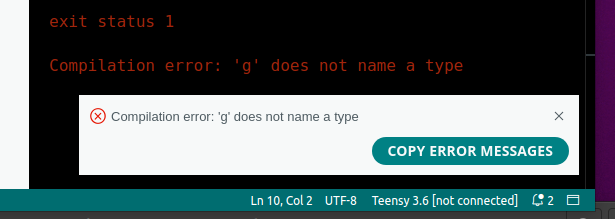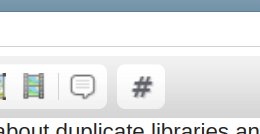/*
MSC Drive read/write copy file
This example code is in the public domain.
*/
#include <USBHost_t36.h>
// Setup USBHost_t36 and as many HUB ports as needed.
USBHost myusb;
USBHub hub1(myusb);
USBHub hub2(myusb);
USBHub hub3(myusb);
USBHub hub4(myusb);
// Setup MSC for the number of USB Drives you are using. (Two for this example)
// Mutiple USB drives can be used. Hot plugging is supported. There is a slight
// delay after a USB MSC device is plugged in. This is waiting for initialization
// but after it is initialized ther should be no delay.
USBDrive myDrive(myusb);
USBFilesystem firstPartition(myusb);
File myFile;
File myFile1;
//************************************************
// Size of read/write buffer. Start with 4096.
// Have tried 4096, 8192, 16384, 32768 and 65536.
// Usually settle on 16384
//
//************************************************
const size_t BUF_SIZE = 4096;
// File size in MB where MB = 1,024,000 bytes.
const uint32_t FILE_SIZE_MB = 32;
// File size in bytes.
const uint32_t FILE_SIZE = 1024000UL*FILE_SIZE_MB;
FASTRUN uint8_t* buf[BUF_SIZE];
uint32_t t;
uint32_t flSize = 0;
float MBs = 1.0f;
void setup()
{
// Open serial communications and wait for port to open:
Serial.begin(9600);
while (!Serial) {
; // wait for serial port to connect.
}
// Start USBHost_t36, HUB(s) and USB devices.
myusb.begin();
Serial.print("\nInitializing USB MSC drive...");
if (!firstPartition.begin(&myDrive)) {
Serial.println("initialization failed!");
return;
}
Serial.println("initialization done.");
Serial.print("\nTesting Write, Copy and Read. BUF_SIZE = ");
Serial.println(BUF_SIZE);
// File root = firstPartition.open("/");
// printDirectory(root, 0);
// fill buf with known data
if (BUF_SIZE > 1) {
for (size_t i = 0; i < (BUF_SIZE - 2); i++) {
buf[i] = (uint8_t *)('A' + (i % 26));
}
buf[BUF_SIZE-2] = (uint8_t *)'\r';
}
buf[BUF_SIZE-1] = (uint8_t *)'\n';
uint32_t n = FILE_SIZE/BUF_SIZE;
if(firstPartition.exists("test.txt"))
firstPartition.remove("test.txt");
// open the file.
myFile = firstPartition.open("test.txt", FILE_WRITE_BEGIN);
// if the file opened okay, write to it:
if (myFile) {
Serial.print("\nWriting to test.txt...");
t = millis();
for (uint32_t i = 0; i < n; i++) {
if (myFile.write(buf, BUF_SIZE) != BUF_SIZE) {
Serial.printf("Write Failed: Stopping Here...");
while(1);
}
}
t = millis() - t;
flSize = myFile.size();
MBs = flSize / t;
Serial.printf("Wrote %lu bytes %f seconds. Speed : %f MB/s\n",flSize, (1.0 * t)/1000.0f, MBs / 1000.0f);
// close the file:
myFile.close();
} else {
// if the file didn't open, print an error:
Serial.println("Error opening test.txt: Write Failed: Stoppiing Here...");
while(1);
}
// re-open the file for reading:
myFile = firstPartition.open("test.txt");
if (myFile) {
Serial.println("test.txt:");
if(firstPartition.exists("copy.txt"))
firstPartition.remove("copy.txt");
// open the second file for writing.
myFile1 = firstPartition.open("copy.txt", FILE_WRITE_BEGIN);
// if the file opened okay, write to it:
if (myFile1) {
Serial.printf("Copying test.txt to copy.txt...");
t = millis();
while(myFile.read(buf, BUF_SIZE) == BUF_SIZE) {
if (myFile1.write(buf, BUF_SIZE) != BUF_SIZE) {
Serial.printf("Write Failed: Stoppiing Here...");
while(1);
}
}
}
t = millis() - t;
flSize = myFile.size();
MBs = flSize / t;
Serial.printf("Copied %lu bytes %f seconds. Speed : %f MB/s\n",flSize, (1.0 * t)/1000.0f, MBs/1000.0f);
// close the files:
myFile.close();
myFile1.close();
} else {
// if the file didn't open, print an error:
Serial.println("error opening test.txt");
}
// re-open the second file for reading:
myFile1 = firstPartition.open("copy.txt");
if (myFile1) {
Serial.println("copy.txt:");
// open the file for a read.
myFile1 = firstPartition.open("copy.txt");
// if the file opened okay, write to it:
if (myFile1) {
Serial.printf("Reading File: copy.txt...");
t = millis();
while(myFile1.read(buf, BUF_SIZE) == BUF_SIZE);
}
t = millis() - t;
flSize = myFile1.size();
MBs = flSize / t;
Serial.printf("Read %lu bytes %f seconds. Speed : %f MB/s\n",flSize, (1.0 * t)/1000.0f, MBs/1000.0f);
// close the files:
myFile1.close();
} else {
// if the file didn't open, print an error:
Serial.println("Error opening copy.txt");
}
Serial.printf("Done..\n");
}
void loop()
{
// nothing happens after setup
}
void printDirectory(File dir, int numSpaces) {
while(true) {
File entry = dir.openNextFile();
if (! entry) {
//Serial.println("** no more files **");
break;
}
printSpaces(numSpaces);
Serial.print(entry.name());
if (entry.isDirectory()) {
Serial.println("/");
printDirectory(entry, numSpaces+2);
} else {
// files have sizes, directories do not
printSpaces(48 - numSpaces - strlen(entry.name()));
Serial.print(" ");
Serial.println(entry.size(), DEC);
}
entry.close();
}
}
void printSpaces(int num) {
for (int i=0; i < num; i++) {
Serial.print(" ");
}
}



